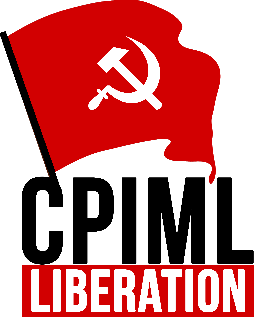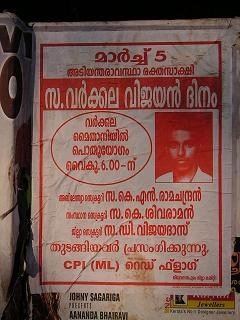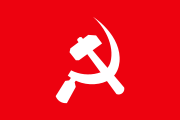
The Communist Party of India (Marxist–Leninist) was an Indian communist party formed by the All India Coordination Committee of Communist Revolutionaries (AICCCR) at a congress in Calcutta in 1969. The foundation of the party was declared by Kanu Sanyal at a mass meeting in Calcutta on 22 April, Vladimir Lenin's birthday. Later the party splintered into several Naxalite groups. The main successor groups are CPIML Liberation and Mukherjee led CPIML.
Communist Party of India (Marxist–Leninist) Janashakti, abbreviated CPI (ML) Janashakti, was a communist political party in India. In 2013, CPI (ML) Jansakthi merged into CPIML.

The Communist Party of India (Marxist–Leninist) Liberation, also referred to as the Liberation group, is a communist political party in India.
Communist Party of India (Marxist–Leninist) Naxalbari was an underground Maoist political party in India. The party had its roots partially in the Maoist Unity Centre, CPI (ML) and partially in the group of Rauf in Andhra Pradesh.

The Provisional Central Committee, Communist Party of India (Marxist–Leninist) is a communist political party in India. The general secretary of the party is Santosh Rana. The party is often referred to as CPI(ML) [Santosh Rana Group] or likewise.

Unity Centre of Communist Revolutionaries of India (Marxist–Leninist) was created through the merger of Andhra Pradesh Coordination Committee of Communist Revolutionaries, Northern Zone Committee RCUC(M-L), West Bengal Communist Unity Centre and West Bengal Co-ordination Committee of Revolutionaries (WBCCR). The formation took place at a unity conference in April 1975. The unity conference adopted a resolution on martyrs, programme, path, method of work, constitution and a statement on unification. The unity conference elected a Central Committee with Devulapalli Venkateswara Rao as its secretary. UCCRI(ML) had as its ambition to unite all communist revolutionary forces, including people within the Communist Party of India (Marxist-Leninist) fold. UCCRI(ML) started publishing the SPARK as its central organ.

Communist Party of India (Marxist–Leninist) Red Flag was formed in 1988 as a break-away from the Central Reorganisation Committee, CPI (ML).
Centre of Communist Revolutionaries of India was formed in 1988 through the merger of the Anand and Harbhajan Sohi factions of UCCRI(ML), CPI(ML) Chandrashekar group, Revolutionary Communist Party and Organizing Committee, CPI(ML). The initiative was taken by the two UCCRI(ML) splinter groups.
Communist Party of India (Marxist–Leninist) Central Team was formed in 1977 when activists from Punjab, Maharashtra and West Bengal of Communist Party of India (Marxist–Leninist) of Satyanaryan Singh revolted against the party leadership. CPI(ML) Central Team reaffirmed the legacy of Charu Majumdar.
The Central Reorganisation Committee, Communist Party of India (Marxist-Leninist) was a communist group in India 1979–1991. The Secretary of the All-India Leading Committee of the CRC, CPI(ML) was K. Venu. The main organ of CRC, CPI(ML) was called Mass Line. CRC, CPI(ML) also published Liberation and Comrade.

Communist Organisation of India (Marxist–Leninist) was a political organisation in India. COI (ML) was formed in May 1985 through the merger of six different groups;
Unity Centre of Communist Revolutionaries of India (Marxist-Leninist) is a political party in Andhra Pradesh, India. It was formed by D.V. Rao after the 1980 general elections, as a split from the original Unity Centre of Communist Revolutionaries of India (Marxist-Leninist). D.V. Rao had been the Central Committee Secretary of UCCRI(ML). However, differences had emerged on issues like how to relate to developments in China after the death of Mao Zedong. D.V. Rao maintained that China under Deng Xiaoping remained a socialist state.
Shamsher Singh Sheri, commonly known by his nom de guerre, Karam Singh, was a communist leader and a Politburo member of the CPI (Maoist) in India.
The Maoist Communist Centre (MCC) was one of the largest two armed Maoist groups in India, and merged with the People's War Group in September 2004, to form the Communist Party of India (Maoist).

The Unity Centre of Communist Revolutionaries of India (Marxist–Leninist) was a communist organisation in India, which emerged from a split in the Unity Centre of Communist Revolutionaries of India (Marxist-Leninist) in 1982.
Communist Party of India (Marxist–Leninist) People's War, usually called People's War Group (PWG), was an underground communist party in India. It merged with the Maoist Communist Centre of India to form the Communist Party of India (Maoist) in 2004. Muppala Lakshmana Rao ('Ganapathi') was the general secretary of the party. The ideology of the party was Marxism-Leninism-Maoism.
Moni Guha was an Indian communist.
The Central Organising Committee, Communist Party of India (Marxist–Leninist) Party Unity, more commonly known as CPI(ML) Party Unity or simply 'Party Unity', was a communist party in India 1982-1998. Narayan Sanyal (politician) alias Naveen Prasad was the general secretary of the party. Party Unity was the official organ of the party. CPI(ML) Party Unity was one of the predecessors of the Communist Party of India (Maoist).
The International Conference of Marxist–Leninist Parties and Organizations (ICMLPO) was an international grouping of political parties and organizations adhering to Mao Zedong Thought founded in 1998 by the Marxist-Leninist Party of Germany. It was organized by a Joint Coordination Group and met every two or three years. It ceased to exist in 2017.
Central Organising Committee, Communist Party of India (Marxist–Leninist) was a communist party in India, one of the main splinter factions of the original Communist Party of India (Marxist–Leninist). COC, CPI(ML) occupied a middle position between the pro-Charu Majumdar group led by Mahadev Mukherjee and the anti-Majumdar group led by Satyanarayan Singh. Failing to articulate a common ideological position, COC, CPI(ML) soon suffered internal divisions and splits. Two of the splinter groups of COC, CPI(ML) in Andhra Pradesh are predecessors of the present-day Communist Party of India (Maoist).





